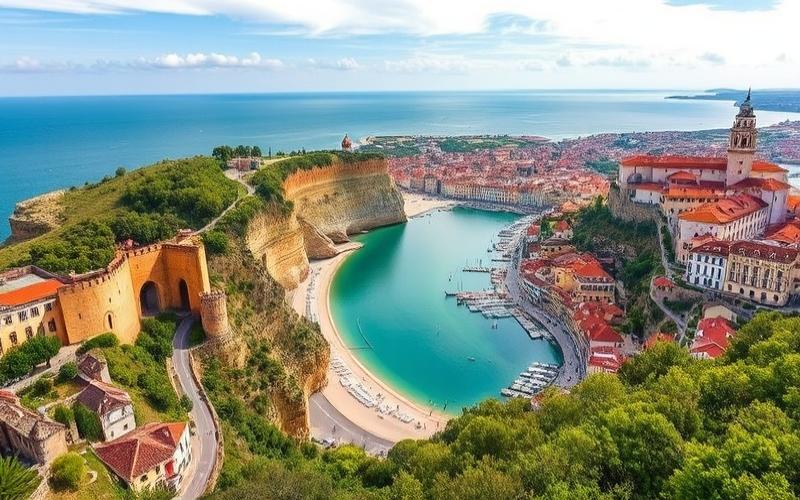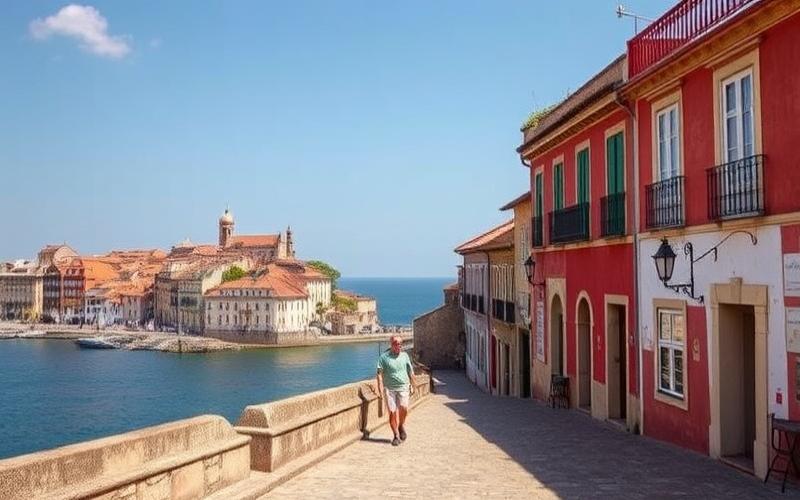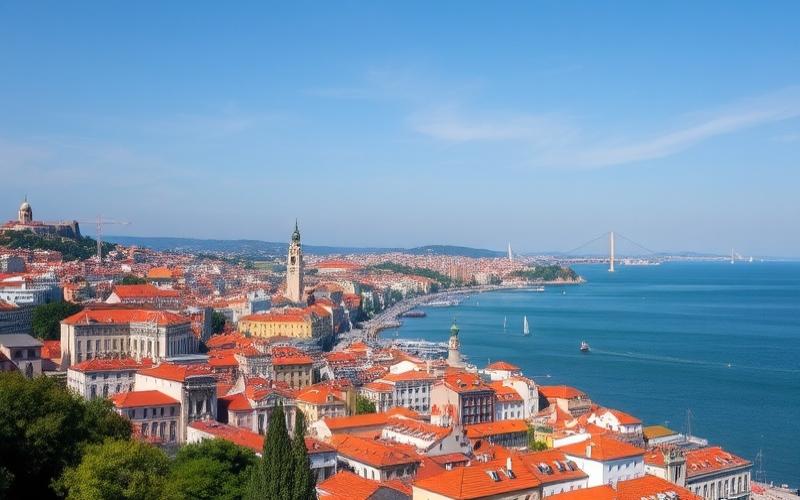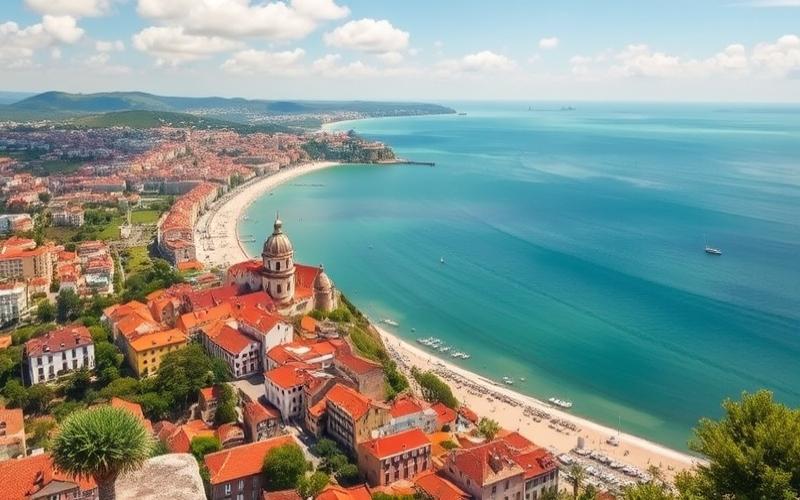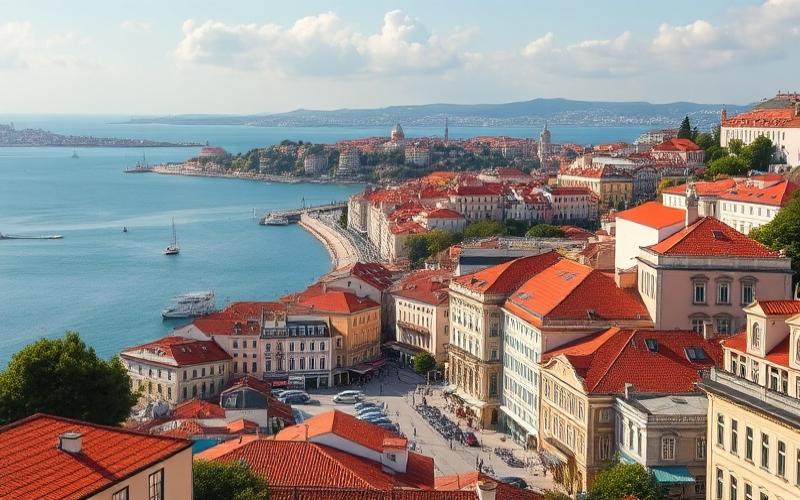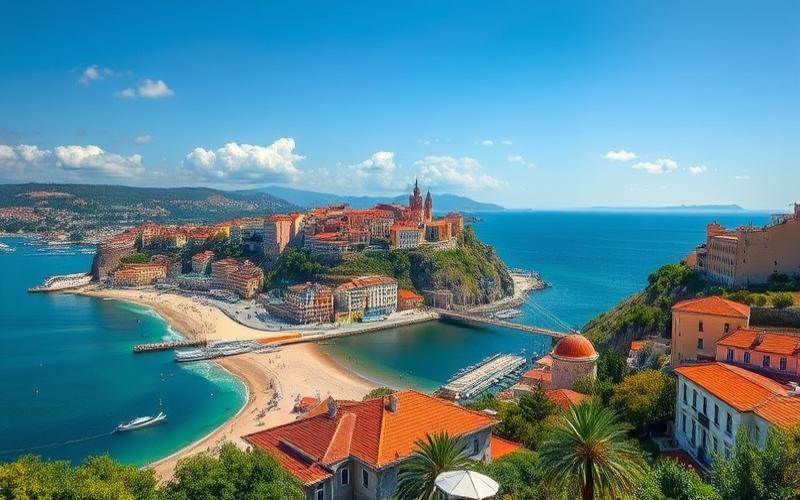
 Published on and written by Cyril Jarnias
Published on and written by Cyril Jarnias
Portugal has become a top destination for many expatriates looking to invest in real estate. With its pleasant climate, attractive cost of living, and promising investment opportunities, the Lusitanian country is attracting more and more foreigners eager to purchase property. However, embarking on such a project requires careful preparation and a good understanding of local specifics. This guide will walk you through the various steps of your real estate investment in Portugal as an expatriate.
The Portuguese Real Estate Market: An Overview for Expatriates
Before diving into purchasing property in Portugal, it’s crucial to understand the dynamics of the local market. The Portuguese real estate sector has experienced significant growth in recent years, attracting numerous foreign investors.
Steady Price Increases
According to recent data, real estate prices in Portugal have seen a notable increase. Indeed, an average rise of 4.3% was recorded over one year, demonstrating the market’s vitality. This upward trend is observed in most regions of the country, with variations depending on the locality.
Diverse Opportunities
The Portuguese real estate market offers a wide variety of options for expatriate investors. Whether you’re looking for a primary residence, a vacation home, or a rental property, you’ll find a broad range of properties suited to your needs. Major cities like Lisbon and Porto remain highly sought after, but other regions such as the Algarve or the Silver Coast are also attracting many foreign buyers.
An Attractive Market for Expatriates
Portugal has implemented several measures to attract foreign investors, including the “Golden Visa” program, which offers tax benefits and the possibility of obtaining a residence permit in exchange for a significant real estate investment. Although the conditions of this program have recently changed, it remains an interesting option for certain investor profiles.
Good to Know:
Despite rising prices, the Portuguese real estate market remains generally more affordable than in many other European countries, offering good value for money for foreign investors.
Legal Aspects of Buying Property in Portugal for Expatriates
Acquiring property in Portugal as an expatriate involves familiarizing yourself with the local legal framework. Although the process is relatively transparent, it’s essential to understand the main steps and legal obligations.
Property Rights in Portugal
In Portugal, foreigners enjoy the same rights as Portuguese nationals when it comes to buying property. There are no specific restrictions for non-residents wishing to acquire property, which greatly facilitates the process for expatriates.
The Purchase Process
Buying property in Portugal typically involves several steps:
- Signing a preliminary contract (contrato de promessa de compra e venda)
- Paying a deposit (usually between 10% and 30% of the sale price)
- Conducting legal and technical checks
- Signing the final deed of sale before a notary
The Role of the Notary
In Portugal, the notary plays a central role in the real estate transaction. They are responsible for verifying the legality of the transaction, drafting the deed of sale, and ensuring all taxes and fees are correctly paid. It is highly recommended to use an experienced notary familiar with transactions involving foreign buyers.
The Importance of a Specialized Lawyer
Although not mandatory, it is strongly advised for expatriates to hire a lawyer specialized in Portuguese real estate law. They can guide you throughout the process, verify document compliance, and help you negotiate the best possible terms.
Good to Know:
Hiring a lawyer represents an additional cost (usually between €1,000 and €3,000), but this investment can save you many problems and lead to long-term savings.
Financing and Tax Considerations for Expatriate Investors
Financing your property purchase in Portugal and understanding the tax implications are crucial aspects of your investment project as an expatriate.
Financing Options for Non-Residents
Portuguese banks offer real estate loans to foreign buyers, but conditions may vary depending on your resident or non-resident status. Generally, the following points should be considered:
- The loan amount can go up to 80% to 90% of the property value
- Interest rates for real estate loans in Portugal are generally between 3.5% and 4%
- The maximum loan term is often limited to 30 years, with an age limit of 75 at the end of the loan
- A personal contribution of about 10% to 15% of the property price is usually required
Real Estate Taxation for Expatriates
Taxation is an important aspect to consider when investing in Portuguese real estate. Here are the main taxes to take into account:
- IMT (Imposto Municipal sobre as Transmissões Onerosas de Imóveis): property transfer tax, varying between 5% and 8% depending on the amount and type of purchase
- IMI (Imposto Municipal sobre Imóveis): annual property tax, generally between 0.3% and 0.8% of the property’s cadastral value
- Capital gains tax upon resale
- Tax on rental income if you decide to rent out your property
Tax Status of Expatriates
Portugal offers interesting tax benefits for certain expatriate profiles, particularly through the “Non-Habitual Resident” (NHR) status. This status, granted for a period of 10 years, can allow you to benefit from advantageous taxation on your foreign-source income.
International Tax Planning
Real estate investment in Portugal as an expatriate can have tax implications in your home country. It’s crucial to understand the tax treaties in force between Portugal and your country of residence to avoid double taxation and optimize your overall tax situation.
Good to Know:
Since April 1, 2020, expatriate retirees in Portugal are taxed at 10% on their French-source income, for a maximum period of ten years. This measure has changed the country’s tax attractiveness for certain investor profiles.
Real Estate Investment Strategies for Expatriates in Portugal
Investing in Portuguese real estate as an expatriate requires a well-thought-out strategy tailored to your personal and financial goals. Here are some approaches to consider:
Primary Residence vs. Rental Investment
The first decision to make concerns the intended use of your property. Buying a primary residence can offer a pleasant quality of life and tax benefits, while a rental investment can generate regular income and potential long-term capital gains.
Location Choice
The choice of region to invest in is crucial. Major cities like Lisbon and Porto offer a dynamic market and interesting capital gains prospects, but prices are higher there. Regions like the Algarve are popular for second homes, while medium-sized cities can offer a good compromise between rental yield and growth potential.
Types of Properties to Prioritize
Depending on your strategy, different types of properties can be considered:
- Downtown apartments for short-term rentals
- Single-family homes for a primary or secondary residence
- Properties to renovate to create added value
- Investments in new real estate projects
Portfolio Diversification
For more ambitious investors, diversifying the real estate portfolio can be an interesting strategy. This may involve purchasing several properties in different regions or investing in different types of properties to spread risks.
Long-Term Considerations
When investing, think long-term. Consider urban development projects, demographic and economic trends in the chosen region. These factors can significantly influence the value of your investment in the coming years.
Good to Know:
The Portuguese real estate market offers interesting opportunities for foreign investors, but it’s important to research local specifics thoroughly and not hesitate to seek professional guidance for your choices.
Administrative and Practical Steps for Expatriate Investors
Buying property in Portugal as an expatriate involves several administrative steps that are important to understand and anticipate.
Obtaining the NIF (Número de Identificação Fiscal)
The NIF is the Portuguese equivalent of a tax identification number. It is essential for any real estate transaction in Portugal. As an expatriate, you can obtain it from Portuguese tax services or through a fiscal representative if you are not a resident.
Opening a Portuguese Bank Account
Although not strictly mandatory, opening a bank account in Portugal will greatly facilitate your transactions and property management. Many Portuguese banks offer services tailored to expatriates.
Property Insurance
Home insurance is mandatory in Portugal for condominium properties and strongly recommended for all types of properties. As an expatriate, make sure you understand the coverage offered and choose a policy suited to your situation.
Remote Management
If you don’t live permanently in Portugal, managing your property remotely can be a challenge. Consider the following options:
- Hiring a rental management agency
- Using technological tools for remote management (surveillance cameras, smart thermostats, etc.)
- Establishing a local network of trust (neighbors, friends) to monitor your property
Residence Permits and Visas
If you plan to spend a lot of time in Portugal or reside there permanently, inquire about the different visa and residence permit options. The Golden Visa program, although recently modified, remains an option for significant real estate investments.
Good to Know:
The increasing digitalization of the Portuguese administration is making procedures easier for expatriates. Many processes can now be done online, simplifying the remote management of your investment.
Conclusion: Succeeding in Your Real Estate Investment in Portugal as an Expatriate
Investing in Portuguese real estate as an expatriate can be a rewarding and potentially lucrative experience. The country offers a pleasant living environment, a dynamic real estate market, and diverse investment opportunities. However, the success of such a project requires careful preparation and a good understanding of local specifics.
Key Points to Remember:
- Familiarize yourself with the local real estate market and its trends
- Understand the legal and tax aspects of buying property in Portugal well
- Explore the different financing options available for non-residents
- Develop a clear investment strategy tailored to your goals
- Anticipate administrative steps and prepare for remote management if necessary
The Importance of Professional Support
To maximize your chances of success, don’t hesitate to seek help from professionals experienced in assisting expatriate investors in Portugal. Specialized lawyers, tax advisors, real estate agents: these experts can guide you through the complexities of the local market and help you make the best decisions for your investment.
An Opportunity to Seize with Caution
Portugal offers real opportunities for expatriates wishing to invest in real estate. With adequate preparation, a well-defined strategy, and professional support, you can turn your investment project into a success, whether for living, vacationing, or generating rental income.
Good to Know:
The Portuguese real estate market, although dynamic, is not immune to fluctuations. Stay informed about economic and regulatory developments to adjust your strategy if necessary.
Disclaimer: The information provided on this website is for informational purposes only and does not constitute financial, legal, or professional advice. We encourage you to consult qualified experts before making any investment, real estate, or expatriation decisions. Although we strive to maintain up-to-date and accurate information, we do not guarantee the completeness, accuracy, or timeliness of the proposed content. As investment and expatriation involve risks, we disclaim any liability for potential losses or damages arising from the use of this site. Your use of this site confirms your acceptance of these terms and your understanding of the associated risks.



